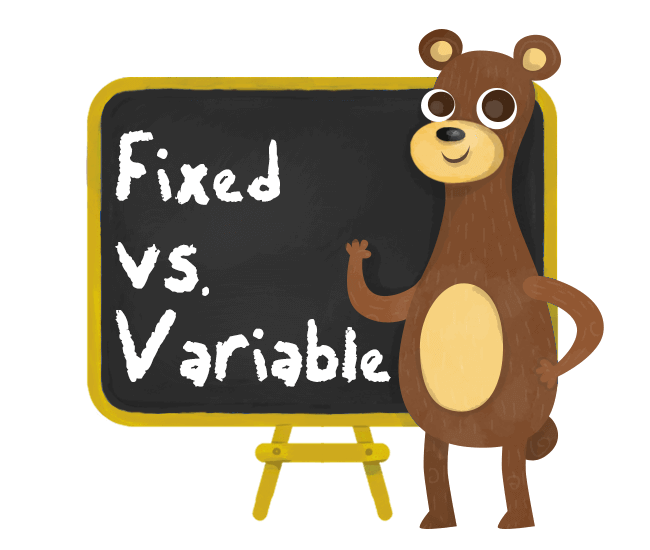
There are several big mistakes that Canadians make in their financial plans. One of the most damaging ones we’ve come across here at Planswell is a fixed rate mortgage. The main reason for this decision is fear. Mortgage professionals (many of whom are under-educated on the topic of interest rates) are paid more for fixed-rate mortgages than they are for ones that are variable.
As a result, they become quite susceptible to drinking the Kool-Aid that a fixed rate mortgage is the responsible thing to do. They are wrong, and it’s costing Canadians over $100,000 in many cases.
So what are the differences between fixed vs variable mortgages and which one helps you, the buyer, save money?
A variable rate mortgage is where your mortgage is based on the prime lending rate, which is based on the overnight lending rate that is controlled by the central bank. This rate changes over time in order to manage inflation and economic growth. Often, the variable-rate mortgage rate will be almost a whole percent lower than a fixed rate, but it comes with the risk that the rate could go up during the term and make the payments more expensive. But that also means there is the potential reward that it could go down.
A fixed rate mortgage is a bet against the bank. You are saying that you bet that over the five-year term, you will, on average, pay less interest than those who chose a variable rate. The reason you take this bet is because you are confident rates will rise significantly over the term. The common reasoning behind this choice is, “My broker said that rates are so low, and they must rise sooner or later,” or, “Rates hit 18% in the 1980s, so if you can lock in anywhere under 5%, you’re in great shape!”
That is, the same bank that goes around the world recruiting the smartest, highest paid engineers from Microsoft and Google. The same bankers who eat lunch and play golf at the same places as the central bankers who set the interest rates. You are betting that you know more about the future of the economy than these people.
Let’s explore how this bet has turned out for most people. Since mortgages were invented, nine of out ten times, a variable rate mortgage was significantly less expensive than a fixed rate. But there’s more. In the 1990’s, central banks began adopting a strict monetary policy with the goal of controlling inflation and interest rates. This makes it much easier for the banks to predict what the future will hold, and therefore do a better job at structuring these bets they make with consumers on mortgages.
What do you think the chances of taking a fixed-rate mortgage and saving money were over the past decade? Zero percent. That’s correct, not a single person in the past decade in Canada who has chosen a fixed rate mortgage has saved money compared to if they had chosen variable at the time.
Here’s an example based on a real Canadian couple:
That 2.5% variable mortgage later went down to 2.00%, but for the sake of simplicity, let’s pretend it stayed constant at 2.5%.
The fixed-rate mortgage cost Tom and Zoey $3,477.81 per month. The variable-rate mortgage would have cost $2,958.38 per month. Had they chosen the lower variable rate payment and invested the difference of $519.43 every month for 10 years, they’d be further ahead. They’d have more than $100,000 in their investment account and they’d owe more than $27,000 less on their house. In fact, their overall net worth would have increased by $128,352.88. That’s a whole lot of money.
What if the interest rates rose? They would be able to use the $100,000+ in their investment account to help make their payments. There would be no change to their monthly expenses.
What if interest rates rose a LOT? If interest rates suddenly rose much higher, the real estate market would likely collapse. Affordability would plummet and defaults would skyrocket. When it came time to renew your mortgage, you’d likely be faced with the choice of a drastically higher payment on a house that is no longer worth what you owe on it, or declaring bankruptcy.
If you are feeling anxious at the moment, please realize that the government already has your back on this one. If rates were to rise a few percentage points, the government could simply extend the amortization from 25 years to 30 or 40 years to allow you to maintain home prices and keep your payments the same.
The moral of the story is, when you are offered a higher payment in exchange for more predictability, you need to analyze the offer and compare the outcomes. If you were to invest the difference, would you come out ahead? How often? If you got it wrong, what would it cost you, compared to if you get it right?
If you’re already a homeowner with a fixed rate, mortgage renewals can be a little bit of work but they are great opportunities to reassess your financial situation.
Of course, it’s best to get started by building a free financial plan with Planswell.
YOUR FREE FINANCIAL PLAN
The best financial plan is also the easiest.
Build your plan today.
Start now